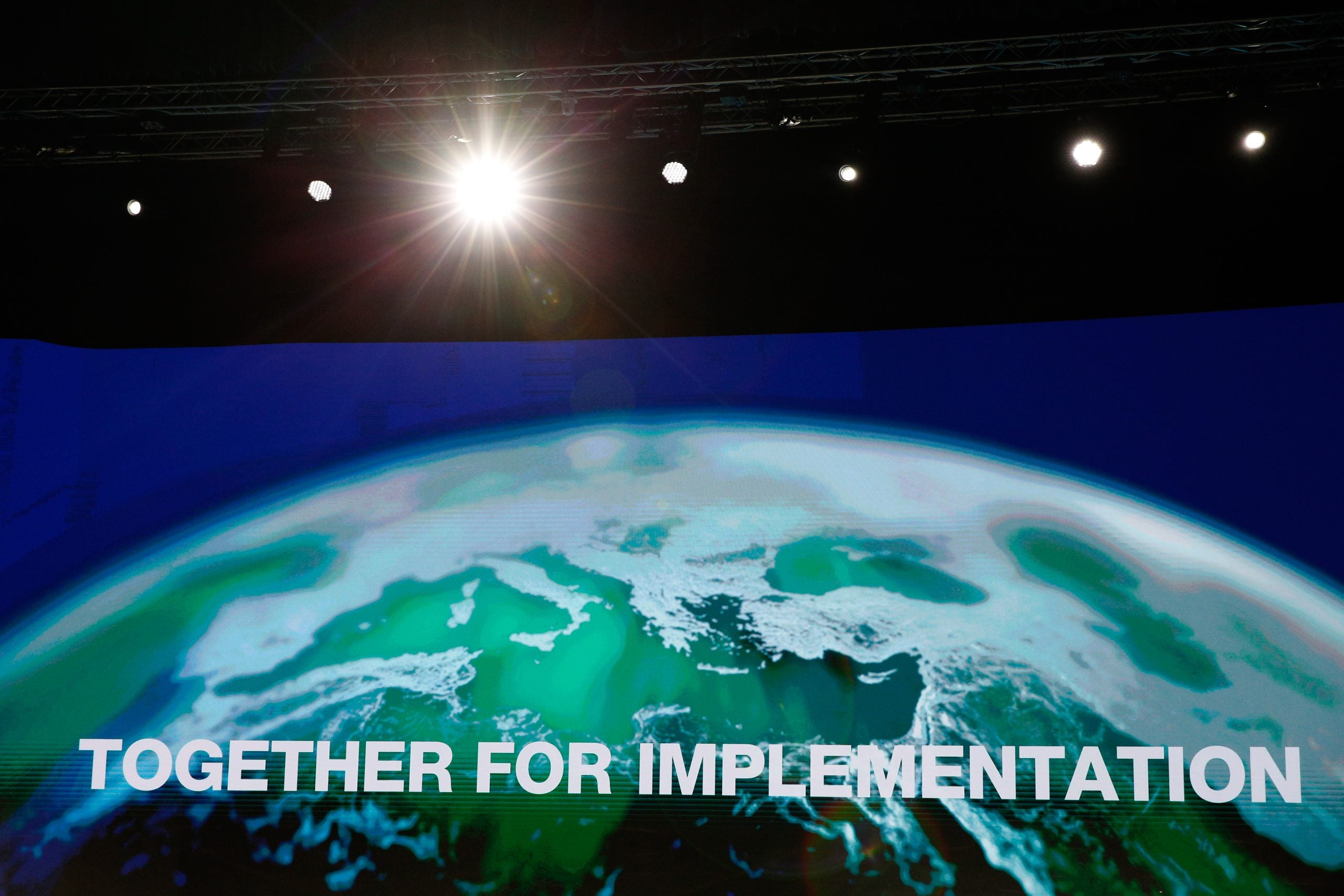Forests have grabbed a prominent spot at COP27. Here are some highlights.

With COP27 now in full gear, we have plenty to be excited about when it comes to forest conservation. Last year’s climate convening in Glasgow put nature at the center of the climate agenda. We celebrated the declaration signed by more than 100 countries in Glasgow to end and reverse deforestation by 2030. The funding promises of almost $20 billion toward forest conservation were equally groundbreaking.
Despite those milestones, in the year since COP26 , the deforestation crisis has actually worsened . Deforestation in the Amazon, for example, increased by 48% over 2021. Yet there is hope.
Countries and companies are realizing the importance of conserving rainforests at scale. Commitments to end deforestation, along with promises to fund and compensate forest conservation, are growing. We’re also seeing more robust standards for emissions reductions credits from natural climate solutions, including forests.
This all bodes well, and COP27 is an opportunity to keep the momentum going on ending deforestation. So, what can we expect in Sharm El-Sheikh when it comes to conserving forests? Here’s a quick overview of the first three days’ action on forests, why they’re important, and what we expect to see over the rest of the conference.
Keeping track of forest conservation goals
Following up on the Glasgow Leaders’ Declaration on Forests and Land Use, 25 world leaders convened on the first day of COP to hold each other accountable on their pledge to end deforestation by 2030. Known as the Forest and Climate Leaders’ Partnership (FCLP), this group is comprised of countries that will convene each year to chart progress on their commitments to end deforestation.
Accountability is key at COP. Declarations are great, but we need action to keep pace with the climate crisis. We need to end and reverse deforestation by 2030 to meet the goals of the Paris Agreement, and financing forest conservation is essential to achieving this.
On the same day that world leaders gathered for the first FCLP meeting, the UN Environment Programme released a report showing that financial commitments needed to meet deforestation goals, known as the Green Gigaton Challenge, are way off track. The Green Gigaton Challenge aims to mobilize funding to reduce one gigaton of emissions from tropical deforestation by 2025, and a gigaton each year thereafter until 2030. The report revealed that less than a quarter of the finance needed to meet the goal has been mobilized to date.
Last month, the Forest Declaration Platform released its latest progress report on the global goal of ending and reversing deforestation by 2030. It found that not one global indicator showed us to be on track toward these goals.
However, the report also contained some promising signals. According to the assessment, the rate of forest degradation is decreasing globally. And some regions, like Southeast Asia, are reversing deforestation at the rate needed to meet the 2030 goal.
The LEAF Coalition
An important step forward for tropical forests at COP27 came from the LEAF Coalition. On Monday, November 7th, LEAF announced that it had increased financial commitments to $1.5 billion for large scale emissions reductions from tropical forests. Volkswagen Group and H&M Group joined the coalition as corporate participants while the Republic of Korea joined as a country backer. The $1.5 billion in commitments to purchase high-quality, jurisdictional-scale emissions reduction credits represents an important demand signal from the private and public sectors.
The promise of LEAF is only fulfilled, of course, if tropical forest countries are able to move forward expeditiously to transact credits for tropical forest protection. So it is equally as encouraging to see that Ecuador, which is working to put into place a robust jurisdictional REDD+ plan, is the first country to sign an agreement with LEAF setting out a roadmap for the signing of an Emissions Reduction Purchase Agreement by April 2023. Other forest countries and jurisdictions are expected to follow Ecuador in signing agreements with LEAF in the coming days.
Importantly, LEAF’s continued growth shows that governments, companies, Indigenous Peoples and civil society can and must work together to stop deforestation at the scale the world urgently needs.
Forest credit integrity
While LEAF’s financial commitments are important, it’s only a fraction of what is possible and necessary. Halting and reversing widespread deforestation will require financing at orders of magnitude higher than current commitments.
A thriving voluntary carbon market can play an important role in protecting forests and putting the world on a pathway to net zero by bringing much needed funding to forest jurisdictions. But the voluntary carbon market can only thrive if it is backed by standards that ensure high integrity of emissions reductions. That’s because companies will only invest in forest carbon credits to meet their net zero goals if they’re confident in the credit’s integrity. They don’t want to risk greenwashing.
Efforts to increase the quality of forest credits include the Tropical Forest Credit Integrity Guide, a collaboration among eight NGOs representing the environment and Indigenous Peoples. The Guide helps companies interested in purchasing carbon credits in the voluntary carbon market differentiate among forest carbon credits and move the market toward credits with high social and environmental integrity.
The authoring organizations issued the first version of their guidance in May of this year, and at COP27 they will provide a preview of the second version, to be published in December. Version 2 expands on the guidance for tropical forest credit integrity by introducing a step-by-step process companies can follow to implement the Guide’s recommendations.
EDF and Forests at COP
Throughout COP27, you’ll likely hear EDF and other environmental organizations discuss the need to support Indigenous Peoples and Local Communities, who play a critical role in conserving nature. They are the strongest frontline forest protectors, and we must ensure that they are protagonists in the design and implementation of global, national, and local efforts to conserve forests.
You’ll also hear about our support for jurisdictional REDD+ and its importance for the voluntary carbon market. Why is does EDF take this approach?
REDD+, or Reducing Emissions from Deforestation and Forest Degradation, i s a global policy framework to provide economic incentives for forest conservation. Expanding REDD+ to the jurisdictional level (country or state) could have added benefits. In fact, when it comes to protecting tropical forests, jurisdictional REDD+ credits provide a triple win. They prevent further emissions from tropical deforestation, protect one of the world’s most important carbon sinks, and preserve critical biodiversity and other ecosystem services we rely on for the global climate and economy to function.
Beyond forest conservation, jurisdictional scale approaches have distinct intrinsic benefits for high environmental integrity. For example, jurisdictional scale approaches reduce risks associated with additionality and non-permanence relative to project-based credits. They also uphold stringent environmental and social safeguards, and generate various social, environmental, cultural and biodiversity co-benefits.
For the reasons above, it is crucial that market solutions and other finance mechanisms further incentivize and support jurisdictional REDD+ programs.
The Nature Zone at COP27
EDF is co-hosting the Nature Zone Pavilion at COP27, a space at COP that will showcase the climate and nature nexus through panel events and discussions. Check out their programming at nature4climate.org/cop-27-nature-zone-pavilion. And if you’re attending COP, you don’t want to miss these Nature Zone events:
- Mechanisms for Tropical Forest Protection in Indigenous Territories in the Amazon, Nov. 11, 1:00 pm – 2:00 pm EET (6:00 am – 7:00 am EST).
- Advancing toward the Glasgow Climate Pact: a call to action to achieve one gigaton of emissions reductions from forests by 2025, Nov. 11, 3:00 pm – 4:00 pm EET (8:00 am – 9:00 am EST).
- Celebrating the Role of Indigenous Peoples in Natural Climate Solutions, Nov. 11, 6:00 pm – 8:00 pm EET (11:00 am – 1:00 pm EST).
- Catalyzing Corporate Climate Action through the Tropical Forest Credit Integrity Guide, Nov. 15, 3:00 pm – 4:00 pm EET (8:00am – 9:00am EST).
As we head into the second week of COP27 and beyond, we must stay focused on turning words into action to conserve forests. To fuel that action, the public and private sectors must increase finance and support for forest jurisdictions. Market and other financial mechanisms must uphold integrity and Indigenous Peoples and local communities need to be involved in decision-making processes as partners. Only then will we be able to truly scale and speed up our efforts to eliminate deforestation.












